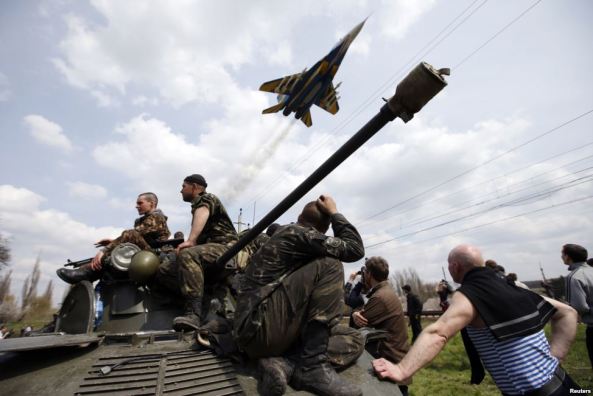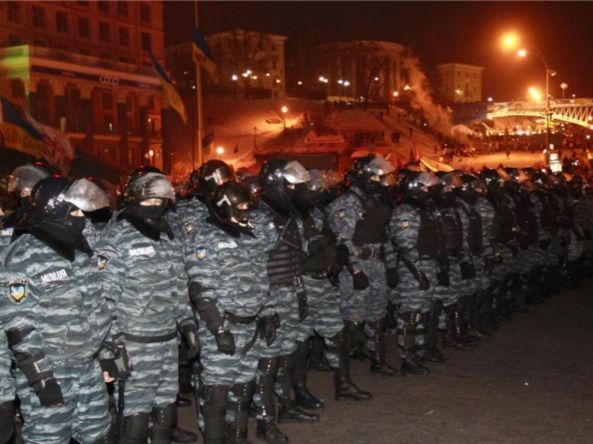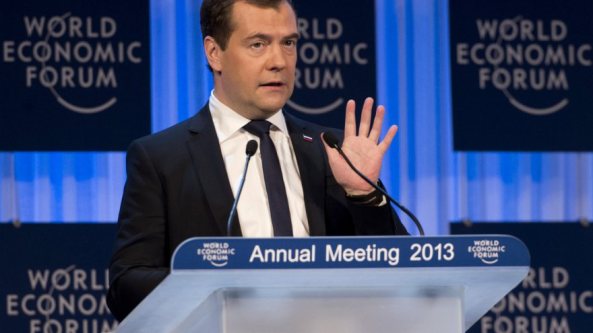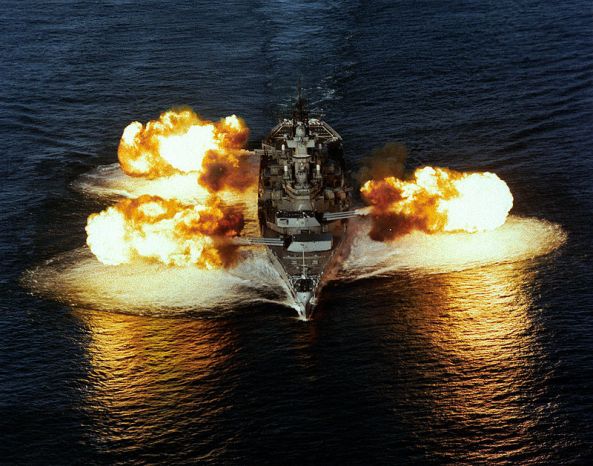
Mounting pressure for a Western strike on Syria has seen naval forces both friendly and hostile to Damascus build up off the embattled country’s coastline.
The potential of a US strike against Syria in response to an August 21 chemical weapons attack in a Damascus suburb gained steam on Wednesday, when a resolution backing the use of force against President Bashar Assad’s government cleared the Senate Foreign Relations Committee on a 10-7 vote.
President Obama has decided to put off military action until at least September 9, when the seemingly recalcitrant US House of Representatives reconvenes to vote on the measure.
Following the August 21 Ghouta Attack, which killed anywhere between 355 to 1,729 people, the diplomatic scramble to launch or stave off a military strike on Syria was mirrored by the movement of naval forces in the Eastern Mediterranean, off the coast of Syria.
The deployment of US and allied naval warships in the region has been matched by the deployment of Russian naval warships in the region.
While the Western vessels have in many cases been deployed in the event a military strike against Syria gets a green light, Russian President Vladimir Putin has said Russia’s naval presence is needed to protect national security interests and is not a threat to any nation.
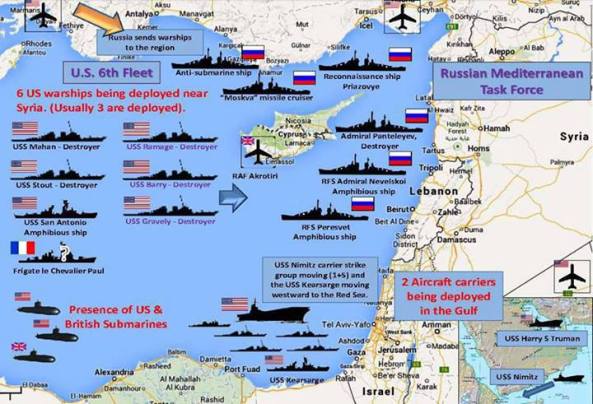
Below is a brief summary of the naval hardware currently amassed off Syria’s shores.
USA
The US Navy has five Arleigh Burke-class guided missile destroyers off the coast of Syria, which its top admiral says is “fully ready” for a wide range of possible actions.
The USS Ramage, USS Mahan, USS Gravely and USS Barry are each armed with dozens of Tomahawk cruise missiles, which have a range of about 1,000 nautical miles (1,151 miles) and are used for precise targeting.
The ships are also equipped with surface-to-air missiles capable of defending the vessels from air attacks.
On August 29, the USS Stout was sent to relieve the USS Mahan, but a defense official told AFP that both ships might remain in the area for the time being.
Adm. Jonathan Greenert, the chief of naval operations, told an audience at the American Enterprise Institute on Thursday that the US ships are prepared for what he called a “vast spectrum of operations,”including launching Tomahawk cruise missiles at targets in Syria, as was done in Libya in 2011, and protecting themselves in the event of retaliation, AP reports.
In addition to the destroyers, the United States may well have one of its four guided missile submarines off the coast of Syria. At one time these subs were equipped with nuclear-tipped ballistic missiles. Nowadays, they are capable of carrying up to 154 Tomahawk cruise missiles.
It was also announced on Monday that the US had deployed the USS San Antonio, an amphibious transport ship, to the Eastern Mediterranean.
The USS San Antonio, with several helicopters and hundreds of Marines on board, is “on station in the Eastern Mediterranean” but “has received no specific tasking,” a defense official told AFP on condition of anonymity.
The deployment of the USS Antonio comes despite promises from President Obama that no amphibious landing is on the agenda, as the US has ostensibly ruled out any “boots on the ground.”
While the wording of the draft resolution set to be put before the House does not permit a ground invasion, the wording of the text could potentially allow troops to carry out non-offensive operations within Syria, including securing chemical weapons stockpiles and production facilities.
On Monday, it was also announced the USS Nimitz super carrier had moved into the Red Sea, though it had not been given orders to be part of the planning for a limited US military strike on Syria, US officials told ABC News.
The other ships in the strike group are the cruiser USS Princeton and the destroyers USS William P. Lawrence, USS Stockdale and USS Shoup.
The official said the carrier strike group has not been assigned a mission, but was shifted in the event its resources are needed to “maximize available options.”
The USS Harry S. Truman aircraft carrier and strike group is also in the northern Arabian Sea.
Russia
Russia, Syria’s longtime ally and primary arms supplier, has its only overseas naval base located in the Syrian port of Tartus, which has reportedly been used to support Russia’s growing number of naval patrols on the Mediterranean. However, Russia insists recent efforts to bolster its naval presence in the region are not in response to Western threats of a military strike.
Reported movements of many Russian ships in the region are coming from anonymous Russian defense ministry sources and have not been confirmed. RT contacted the Russian Navy to ask for confirmation of the reported ship movements, though no comment was forthcoming.
On Friday, for example, the large landing ship, Nikolai Filchenkov, was reportedly dispatched from the Ukrainian port city of Sevastopol for the Russian Black Sea port of Novorossiisk, from where it is eventually expected to reach the Syrian coast, a source told Interfax News Agency.
“The ship will make call in Novorossiisk, where it will take on board special cargo and set off for the designated area of its combat duty in the eastern Mediterranean,” the source said.
RIA news agency quoted an unnamed senior naval source as saying on Friday that the frigate, Smetlivy, would leave for the Mediterranean on September 12-14, and the corvette Shtil and missile boat Ivanovets would approach Syria at the end of the month.
The Russian destroyer Nastoichivy, which is the flagship of the Baltic fleet, is also expected to join the group in the region.
Deputy Defence Minister Anatoly Antonov, who was unable to comment on specific reports, said on Thursday the Russian navy currently had a “pretty strong group” there.
“The Russian navy does not intend to take part directly or indirectly in a possible regional conflict,” he told the state Rossiya 24 broadcaster.
“Our navy vessels are a guarantee of stability, guarantee of peace, an attempt to hold back other forces ready to start military action in the region.”
Also reportedly in place in the eastern Mediterranean are the frigate Neustrashimy, as well as the landing ships Alexander Shabalin, the Admiral Nevelsky and the Peresvet.
They are expected to be joined by the guided-missile cruiser Moskva.
The Moskva, set to arrive in a little over a week’s time, will take over operations from a naval unit in the region.
“The plans of the naval unit under the command of Rear Admiral Valery Kulikov had to be changed a little. Instead of visiting a Cape Verde port, the cruiser Moskva is heading to the Strait of Gibraltar. In about ten days, it will enter the eastern Mediterranean, where it will replace the destroyer Admiral Panteleyev as the flagship of the operative junction of the Russian Navy,” a source told Interfax on Wednesday.
Panteleyev incidentally, only arrived in the east Mediterranean Sea on Wednesday after leaving the Far-Eastern port city of Vladivostok on March 19 to join the Russian standing naval force as its flagship.
The SSV-201 reconnaissance ship, Priazovye, is also reportedly on its way to join the group in the Eastern Mediterranean. Accompanied by the two landing ships, Minsk and Novocherkassk, the intelligence ship passed through the ‘Istanbul Strait’ on Thursday, which helps form the boundary between Europe and Asia.
FRANCE
On August 31, French military officials confirmed the frigate Chevalier Paul, which specializes in anti-missile capabilities, and the transport ship, Dixmude, were in the Mediterranean. French officials denied they are in the region to participate in military action against Syria, but were rather taking part in training and operation preparations.
Despite their presence in the region, France currently has no ship-based missiles, so any offensive action would come from the air in the form of long-range Scalp missiles, similar to those the nation used in Kosovo in 1999 and in Libya in 2011, Time reports.
Italy
Two Italian warships set sail for Lebanon on Wednesday in a bid to protect 1,100 Italian soldiers in the United Nations Interim Force in Lebanon, Syria’s southeastern neighbor, Agence France Presse reported.
The Italian ANSA news agency reported that a frigate and a torpedo destroyer boat departed from Italy’s southeastern coast on Wednesday and would provide additional protection to the soldiers in the event the Syrian conflict further deteriorates.
UK
As of August 29, the Royal Navy’s Response Force Task Group was deployed in the Mediterranean as part of long-planned exercise Cougar 13. The force includes helicopter carrier HMS Illustrious, type-23 frigates HMS Westminster and HMS Montrose, amphibious warship HMS Bulwark and six Royal Fleet Auxiliary ships.
The Trafalgar-class nuclear submarine HMS Tireless was also believed to be in the area at the time, after it was detected in Gibraltar.
On the same day that British media started touting Britain’s “arsenal of military might” which would be available in the event of intervention, British Prime Minister David Cameron lost a vote endorsing military action against Syria by 13 votes. In light of the shocking parliamentary defeat, Foreign Secretary William Hague said the UK would only be able to offer the US “diplomatic support.”
The UK’s Conservative Chancellor, George Osborne, confirmed that the UK would not seek a further vote on action in Syria.
Source: RT News
